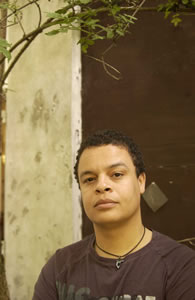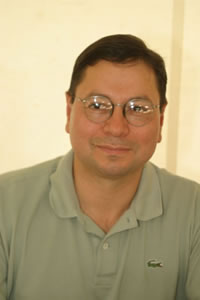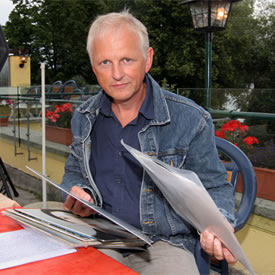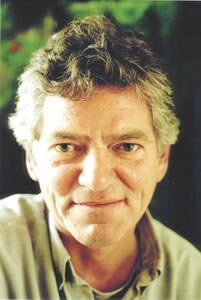De Zuid-Afrikaanse schrijver en dichter Breyten Breytenbach werd geboren op 16 september 1936 in Bonnievale. Zie ook mijn blog van 16 september 2006 en ook mijn blog van 16 september 2007 en ook mijn blog van 16 september 2008.
Report
I saw couples kissing in doorways
turning around with open mouths I walked
across bridges and heard people cough below
I saw grayheads riding in taxis
look through rain-thick windows at buildings
no longer there. snow in winter
and grapes in the summer but I
don’t remember much about it
I saw the midnight sun
and birds of all sizes and fish
in the water and the southern cross above a peak
and cats wearing boots and drunken women
and bare trees with blossoms.
snow in the winter
and grapes in summer but
I don’t remember much about it
I too heard roosters crow
and the call of trains and voices
in my bed and gods on the roof and I saw
dragons in zoos and the beards
of friends and smelled the sun.
snow in winter and grapes in summer
but I don’t remember much about it
death sets in at the feet
One should simply doze off
yet they say for 48 hours consciousness will
still beat at the steamed-up windows of the skull
like a fish in a basket
or an astronaut in his spacetub beyond control
or a Jew under a pyramid of Jews
or a nigger(lover) in a cell
with a prickling of pins that begins in the soles.
Could it be thus?
The giddiness as the floor tilts
and a membrane of water draws over trees
and a zealous hand embraces the throat more tightly?
And what a farce, this fumbling for pictures.
Last week’s chrysanthemums are already rotten
on their stems, the green veins perished rubber tubes,
they who were yakking parrots
are now drooping withered wings.
Yesterday’s white carnations stink like slumped old women.
Yesterday’s red roses have a deeper bloom
as smothered fists.
People usually die flat on their backs,
feet coldly erect as petrified rabbits
or blossoms on a branch,
with a prickling of pins that begins in the soles.
My feet are recalcitrant: I must cajole them,
swaddled in rags, because I’m not yet done,
must still learn how to die,
I must still decide how to make up my mind.
For now I gaze through a mirror into a riddle,
but tomorrow it will be from face to face.
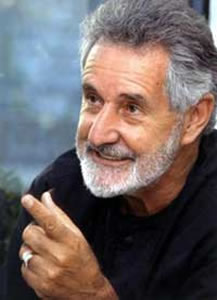
Breyten Breytenbach (Bonnievale, 16 september 1936)
De Nederlandse dichter Alfred Schaffer werd geboren in Leidschendam op 16 september 1973. Hij is de zoon van een Arubaanse moeder en een Nederlandse vader. Schaffer debuteerde in 2000 met de dichtbundel Zijn opkomst in de voorstad. In 2004 verscheen zijn vierde dichtbundel. Hij werkte regelmatig samen met de Zuid-Afrikaanse schrijfster Antjie Krog en was na zijn promotie als Fellow aan de Universiteit van Kaapstad verbonden. Schaffer, zoon van een Limburgse vader en Arubaanse moeder, woonde vanaf 1996 een tijd in in Zuid Afrika. Zijn boeken verschijnen bij de Bezige Bij, waar hij als werkzaam is als redacteur. Schaffer is tevens redacteur van het tijdschrift Bunker Hill.
Slotzinnen genoeg zou je zeggen
Nu wordt het ingewikkeld, struikel niet over de rommel. ‘Kijk eens,
ook hier hebben mensen gewoond.’ Een dagreis van vandaag blijft alles
bij het oude: de penetrante lucht van enkelvoud, het straatleven o zo
geloofwaardig, de natuurramp die aan alle twijfel een einde zal maken.
Met de schrik vrij heet dat dan, eind goed al goed, de uitgestrektheid
is het ritselen dat ons omgeeft. Dat wordt flink dringen geblazen.
‘Jij hier?’ ‘Jij hier?’ Resteert de vraag wie van ons beginnen mag, hand
op het hart. Groot verdriet. Wie weet wat we straks zullen zeggen.
Weer dwalen we af, het is net echt. Je moest er nodig eens tussenuit,
je ziet de laatste tijd de gekste dingen – je zou bijvoorbeeld kunnen liften,
zet je schrap. Lekker weg in eigen land. Wacht, ik loop even met je mee,
ik moet toch die kant uit. Er zit een vlekje op je bloes. Nee, iets hoger.
Alfred Schaffer (Leidschendam, 16 september 1973)
De Amerikaanse schrijver Michael Nava werd geboren op 16 september 1954 in Stockton, Calefornië, en groeide op in Sacramento. In 1981 voltooide hij zijn studie rechten aan de Stanford universiteit, waar hij een jaar eerder zijn partner Bill Weinberger had leren kennen. Zij runden samen een advocatenpraktijk, eerst in Palo Alto, vanaf 1984 in Los Angeles. In 1986 verscheen de eerste roman The little death. Na zeven delen was de romancyclus over de homosexuele advocaat Henry Rios in 2001 afgesloten. Nava praktizeert sinds 1995 in San Francisco en is ook actief in de homobeweging.
Uit: Rag And Bone
I wasn’t usually so dyspeptic this early in the day, but I had the world’s worst heartburn, undoubtedly the result of a breakfast that had consisted of four cups of coffee, a bagel that was half-burned and half-frozen-I really needed a new toaster-and a handful of vitamins. The bitter aftertaste of the pills lingered at the back of my throat. Also, now that I noticed it, my right arm was throbbing. Great. When I was a teenager, I’d suffered through growing pains; at forty-nine, I was suffering through growing-old pains.
The young deputy A.G. beside me pored over his notes and muttered to himself, as if he were about to argue before the United States Supreme Court rather than a three-judge panel-two white-haired white men, one graying black lady-of the intermediate state appellate court. His knee knocked nervously against mine and I glanced at him. He was a handsome boy with that luminous skin of the young, as if a lantern were burning just beneath the flesh.
“‘Scuse me,” he murmured without looking up.
“Your first appearance?” I asked.
Now he looked. His eyes were like cornflowers. “Is it that obvious?”
“Don’t be too anxious,” I said. “They’ve already written the opinion in your case.”
“Really?”
“Really,” I said. “Oral argument’s mostly for show. It’s hardly worth bothering to show up.”
“Then why are you here?”
“I’m a criminal defense lawyer,” I said. “Tilting at windmills is my specialty.”
He smiled civilly, then returned to his notes.
“We will hear People versus Guerra,” the presiding justice said.
I pulled myself out of the chair and made my way to counsel table. The young A.G. beside me also stood up.
“You’re Mr. Rios?” he said as we headed to counsel table.
“None other,” I replied.
He held open the gate that separated the gallery from the well of the court where counsel tables were located, and said, “Great brief. I had to pull an all-nighter to finish my reply.”
I remembered his brief had had the whiff of midnight oil. “Thanks. You did a good job, too.”
I set my file on my side of the table and was gripped by a wave of nausea so intense I was sure I was going to vomit, but the moment passed.
“Counsel?”
I looked up at the presiding justice, Dahlgren, who was not much older than me and quite possibly a year or two younger.
“I’m sorry, Your Honor.”
“Your appearance, please.”
“Yes, Your Honor,” I grunted. “Henry Rios for defendant and appellant Anthony Guerra.”
“Mr. Rios,” the lady judge, Justice Harkness, spoke. “Are you all right? You went white as a ghost a second ago.”
“Heartburn, Justice Harkness. I’ll be fine with a little water.” I poured a glass from the carafe on the table. My hand was shaking.
Michael Nava (Stockton, 16 september 1954)
De Duitse schrijver Andreas Neumeister werd geboren op 16 september 1959 in Starnberg. Hij studeerde na het gymnasium ethnologie in München. Neumaster staat in de traditie van de popliteratuur. Ook rap poetry wordt in zijn collage-achtige teksten verwerkt. In zijn werk „Könnte Köln sein“ onderzoekt hij de samenhang tussen architectuur, politiek en geschiedenis. In 1993 ontving Neumeister de Förderpreis zum Alfred-Döblin-Preis en in 1996 de Bayerische Förderpreis für Literatur.
Uit: Könnte Köln sein
“Aus dem Wasser ans Land gekrochen. Auf dem Umweg über das Reptil zum aufrechten Gang gefunden. Im Schutz von Bäumen übernachtet. Wo es Höhlen gab, in den Schutz von Höhlen gekrochen. In den tiefsten Höhlen überwintert. Horden gebildet. Immer wieder die Kontinente gewechselt. Auf dem Umweg über Landbrücken und Pässe weites Neuland besiedelt. Vom Urknall über den Urschrei zur Urhütte gefunden. Das Feld vor der Hütte als Anlass genommen, sesshaft zu werden. Gesellschaftsvertrag. Dörfer gebaut. Fehden gefochten, Schanzen gebaut. Kriege geführt. Grenzen gezogen, Mauern errichtet. Neue Säue durch neue Dörfer getrieben. Gräben gegraben, Mauern geschliffen. Entdeckungen gemacht und Hürden übersprungen. Dabei immer wieder in den Regen geraten. Auf dem Umweg über die Geschichte immer wieder in die Geschichtslosigkeit zurückgefallen. Auf dem Umweg über Abgründe immer wieder festen Boden unter die Füße bekommen. Städte gegründet und Handel getrieben. Immer größere Ansiedlungen geplant. Staaten gegründet. Kriege geführt. Meere überwunden und aus fernen Kontinenten unerhörte Schätze mitgebracht. Sklaven verschifft und weiterverkauft. Städte befestigt und Burgen geschleift.
Neue Waffen erfunden und Kirchen geweiht. Schulen errichtet, Kasernen gebaut. Niederlagen beweint. Siege gefeiert. Immer wieder aufgerappelt und von Neuem gestrauchelt. Gold eingeschmolzen und Münzen geprägt. Dächer geflickt und Paläste angezündet. Vom Land in
die Städte geflüchtet. Fabriken hochgezogen, Produkte verkauft. Eisenbahnlinien in die Landschaft getrieben und um neue Bahnhöfe neue Siedlungen erichtet. Baumschulen gegründet, Hecken gepflanzt
wo waren wir stehengeblieben?
Brieftauben, schreibt der weltkundige Wissenschaftsteil heute, nutzen gerne das Straßennetz zur Orientierung. Offensichtlich folgen die Tiere lieber Autobahnen oder Schienen, als sich nach ihrem angeborenen Orientierungssinn zu richten – selbst wenn es für sie einen Umweg bedeutet.”
Andreas Neumeister (Starnberg, 16 september 1959)
Foto: Franz-Xaver Fuchs
De Amerikaanse schrijver James Alan McPherson werd geboren op 16 september 1943 in Savannah, Georgia. In 1978 won hij de Pulitzer Prize voor fictie voor zijn bundel korte verhalen Elbow Room. Zijn werk is gepubliceerd in 27 kranten en tijdschriften, in zeven bloemlezingen van short stories. McPherson studeerde aan de Morgan State University, Morris Brown College, Harvard Law School, de University of Iowa’s Writers’ Workshop, en aan Yale Law School. Hij doceerde Engels aan de University of California, Santa Cruz, Harvard, en gaf lezingen in Japan.
Uit: Hue and Cry. Stories
“Thomas Brown stopped going to church at twelve after one Sunday morning when he had been caught playing behind the minister’s pulpit by several deacons who had come up into the room early to count the money they had collected from the other children in the Sunday school downstairs. Thomas had seen them putting some of the change in their pockets and they had seen him trying to hide behind the big worn brown pulpit with the several black Bibles and the pitcher of ice water and the glass used by the minister in the more passionate parts of his sermons. It was a Southern Baptist Church.
“Come on down off of that, little Brother Brown,” one of the fat, black-suited deacons had told him. “We see you tryin’ to hide. Ain’t no use tryin’ to hide in God’s House.”
Thomas had stood up and looked at them; all three of them, big-bellied, severe and religiously righteous. “I wasn’t tryin’ to hide,” he said in a low voice.
“Then what was you doin’ behind Reverend Stone’s pulpit?”
“I was praying,” Thomas had said coolly.
After that he did not like to go to church. Still, his mother would make him go every Sunday morning; and since he was only thirteen and very obedient, he could find no excuse not to leave the house. But after leaving with his brother Edward, he would not go all the way to church again. He would make Edward, who was a year younger, leave him at a certain corner a few blocks away from the church where Saturday-night drunks were sleeping or waiting in miseryfor the bars to open on Monday morning. His own father had been that way and Thomas knew that the waiting was very hard.
He felt good toward the men, being almost one of them, and liked to listen to them curse and threaten each other lazily in the hot Georgia sun. He liked to look into their faces and wonder what was in their minds that made them not care about anything except the bars opening on Monday morning. He liked to try to distinguish the different shades of black in their hands and arms and faces. And he liked the smell of them. But most of all he liked it when they talked to him and gave him an excuse for not walking down the street two blocks to the Baptist Church.”
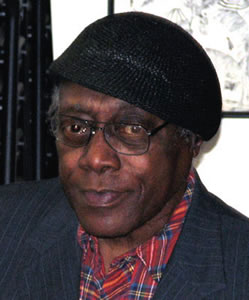
James Alan McPherson (Savannah,16 september 1943)
De Nederlandse schrijver Frans Kusters werd geboren in Nijmegen op 16 september 1949. Hij studeerde rechten aan de Katholieke Universiteit Nijmegen. Na zijn studie werd hij daar parttime wetenschappelijk medewerker. In 1973 schreef hij acht korte verhalen, die werden gebundeld in de Gelderse Literaire Reeks. Hij won hiermee de Reina Prinsen Geerligsprijs. De verhalenbundel is daarna uitgebreid en onder de titel De reis naar Brabant, en andere verhalen bij De Bezige Bij uitgegeven. In 1977 was hij mede-initiator van het Literair Café Nijmegen in O’42. Daarnaast richtte hij rond deze tijd het literaire tijdschrift De Schans op, samen met Thomas Verbogt, Nop Maas en Anton Fasel. In 2001 publiceert hij zijn eerste roman, Na het wonder.
Uit: Na het wonder
‘En waar ze net nog aan het klaverjassen waren, zijn ze nu ineens aan het bamzaaien, zo lijkt het wel. Maar dan zijn ook de luciferhoutjes van het ene moment op het andere verdwenen en toch bamzaaien zij steeds fanatieker verder. Raadsels. Dilemma’s. Onzekerheden. Waar Theo is, zijn er, kortom, altijd raadsels, dilemma’s en dubbele bodems. Maar het zijn wel de raadsels, de dilemma’s en de dubbele bodems waar het in de hedendaagse kunst om gaat. Uitzoomen, even opnieuw inzoomen, dan bevriezen en aftitelen.’
Frans Kusters (Nijmegen, 16 september 1949)
Zie voor nog meer schrijvers van de 16e september ook mijn vorige blog van vandaag.












